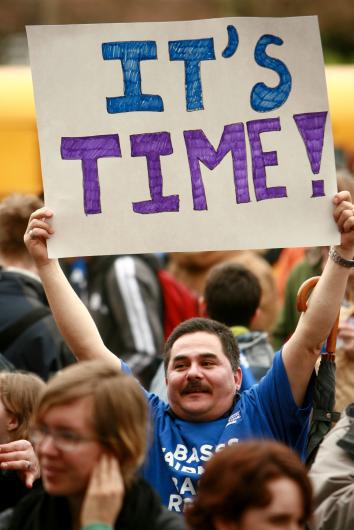I wasn’t around to experience the pain of segregation or to witness the injustices faced by interracial couples in Virginia’s past. Nearly 40 years after Mildred and Richard Loving fought to see their marriage recognized in the state they loved, I myself witnessed a new series of injustices in my home state. In 2006, Virginians passed a constitutional amendment that not only reinforced its existing ban on same-sex marriages but also bans legal recognition of any relationship “approximat[ing] the design, qualities, significance, or effects of marriage.” Virginia didn’t just outlaw gay marriage; it told its gay citizens: You are not welcome here.
I was one of those citizens, and I took that message to heart. Like many others, I eventually moved to Washington, D.C., where marriage equality and employment nondiscrimination ensure that LGBTQ citizens are able to live and work as equals. Whenever I cross the bridge to Virginia, I’m faced with a painful reminder of a commonwealth that didn’t want me. Whenever I want to see my young nephew laugh, have a beer with my brother, or sit down for a meal with my parents, I’m forced to relive the day I left my home.
All that just changed. On Thursday, U.S. District Judge Arenda L. Wright Allen struck down Virginia’s ban on marriage equality, holding that it violated the constitutional rights of gay people. (The ruling is temporarily stayed, pending appeal.) Federal judges in several other states have issued similar rulings in recent months, but the historical arc in Virginia’s case is particularly satisfying given the state’s fraught, complex, and ultimately triumphant relationship with equal marriage.
The legacy of Loving v. Virginia weighs heavily on the pages of Judge Wright Allen’s opinion, which opens with a quote from Mildred Loving—who was a vocal supporter of same-sex marriage—before discussing the case at hand. Judge Wright Allen also borrows from another great champion of equality, Abraham Lincoln, in explaining the basic yet profound aims of the gay couples suing for their rights: “The men and women,” she writes, “and the children too, whose voices join in noble harmony with Plaintiffs today, also ask for fairness, and fairness only. This, so far as it is in this Court’s power, they and all others shall have.”
Inasmuch as simple justice is satisfying, so, too, is the simple recognition of injustice. In her opinion, Judge Wright Allen rebukes the demons of Virginia’s past, scolding the lawmakers who precipitated my exodus from the state and the “moral condemnation [that] continues to manifest in Virginia in state-sanctioned activities.” She chastises former Attorney General Ken Cuccinelli for his assault on LGBTQ students and faculty at state colleges and universities, and tears into the Virginia law that allows adoption agencies to discriminate based solely on sexual orientation. Indeed, the vicious homophobia displayed by Cuccinelli and, in particular, state delegate Bob Marshall, has now been catalogued as the very evidence of institutional bias against gay and lesbian citizens that necessitated the ruling itself.
These days, things are looking up in Virginia. The majority of Virginians now support marriage equality; they’ve elected politicians who reflect their values; and now their judiciary has stood firm as a defender of equal rights. The commonwealth, in short, has signaled that it’s ready to welcome back its gay and lesbian sons and daughters—if we’re ready to return. For those of us who never thought this moment would come, the impact is overwhelming. When I finally crossed the Potomac and moved to D.C., I promised myself I’d never return. But reading the brave and beautiful words of Judge Wright Allen’s opinion on Thursday night, Virginia suddenly felt—for the first time in a long time—like home.
